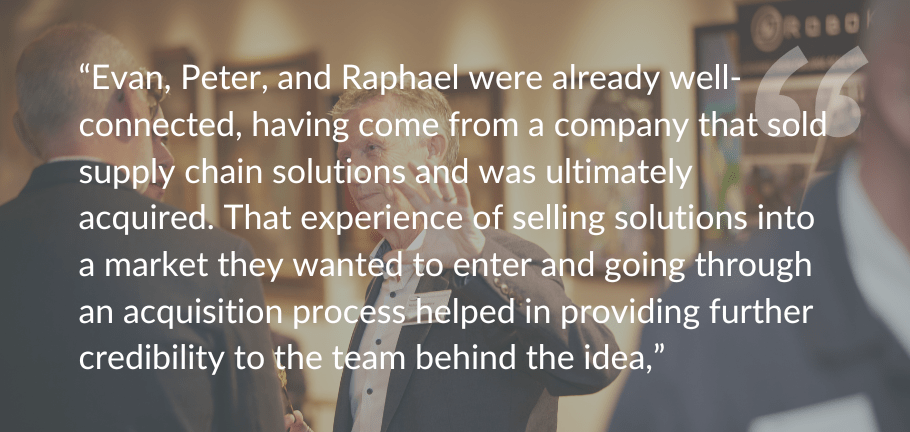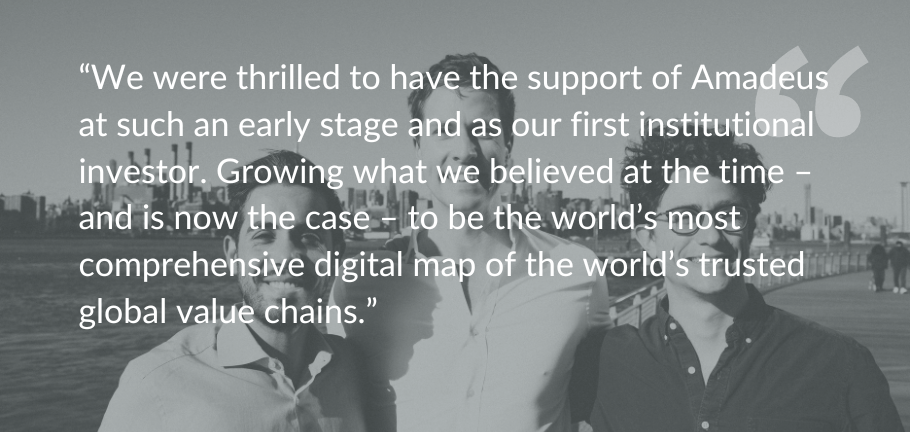Altana, now a billion dollar company HQ’d in New York, emerged in 2019 to address a global issue that affects almost every industry and government: a lack of visibility across supply networks. It was founded by three pioneers, Evan Smith, Peter Swartz, and Raphael Tehranian, with the vision to create an accurate and unified digital representation of global value chains.
Sharing intelligence has been a growing concern for businesses as governments introduce trade restrictions as well as economic security, procurement, climate, and national security policies to govern global value chains. Knowing and managing these networks was incredibly complex until Altana introduced its platform as a single source of truth.
The three founders achieved this through federated machine learning, a sub-field of machine learning which involves multiple entities collaboratively training a model without actually sharing the data it’s trained on. This decentralisation of data is how Altana’s Value Chain Management System allows governments and enterprises to share intelligence about their supply chain, without sharing any of the underlying data.
Altana has grown from a shared vision by three pioneering founders, to an organisation valued at $1 billion. Read on to find out how Amadeus backed the company from seed stage.
Finding funding for emerging AI
In 2020, while many of us watched the news and wondered on the state of the world, the Altana team – then fewer than 20 – were looking for funding. Fundraising can be a challenge at the best of times, let alone during a pandemic, but that didn’t stop Altana’s founders.

The Amadeus team discovered Altana through Amadeus’ own Co-Founder and CEO, Anne Glover, who knew the Altana management team. As it happened, Nick Kingsbury, the Amadeus Partner who ultimately led the investment into Altana, had already been doing some research on federated machine learning. He saw it as a promising emerging area in AI:
“I was already looking at federated machine learning as a concept, as we’re (Amadeus) always looking at subsets of emerging technology for investment opportunities and this stuck out to me as an interesting one.”
Having been tipped onto Altana, Nick had some due diligence to do. One aspect of the company that appealed to him during this process was its leadership and their experience in the global supply chain market.
“Evan, Peter, and Raphael were already well-connected, having come from a company that sold supply chain solutions and was ultimately acquired. That experience of selling solutions into a market they wanted to enter and going through an acquisition process helped in providing further credibility to the team behind the idea,” said Nick.
Not only were the founders well-versed and connected in their industry, but they had seen first-hand the process of acquisition at a senior level. Understanding the process behind exiting a business is especially important in venture capital.
Business value from a concept
Demonstrating business value from a concept is a challenge that most deep tech founders struggle with when fundraising. Altana didn’t have any product revenue when the founders were pitching their concept, but they did have direct experience of the global supply chain data market and a strong advisory board. This board included Alan Bersin (former Commissioner of US Customs and Border Protection), Khoo Boon Hui (former President of Interpol), and other prominent leaders in supply chain risk management, law enforcement, and logistics. The team was steeped in global supply chain data with a deep understanding of the challenges customers faced in the industry – with lack of visibility and risk topping that list.

Altana founders, left to right: Raphael Tehranian, Evan Smith, Peter Swartz.
The founders had built a master knowledge graph of everything that’s happening in the global physical supply chain and applied AI in the form of a federated machine model learning to it. By using this approach, customers could take intelligence and learning from Altana’s Value Chain Management System and add their own data to their own instance, keeping their data confidential. The magic of the federated machine learning model meant that intelligence gained from the combined data could selectively enrich the master knowledge graph. This rich body of information for Altana customers ultimately solved the biggest problems in the market: a lack of visibility and mitigation of risk.
The combination of brilliant technologists, innovative technology, deep intellectual property, and direct experience of the problem facing customers in their market ultimately led to Nick’s decision to pursue investment. The first investment made into Altana was in 2020 with Amadeus as the first institutional investor.
Growth timeline
Altana has grown substantially in the past four years, most recently closing a $200 million Series C, with the company attaining its $1 billion valuation in the process. The leadership team and advisory board both contributed to the success of the company.
Having key advisors on board isn’t only helpful for advice on running the business, but it also helps in attracting investors and bolstering the credentials of the leadership team. Growing the advisory board along the way has helped to support Altana’s growing needs.
The company has gone through several funding rounds. The seed round led by Amadeus Capital Partners was followed by a Series A led by GV (Google Ventures) with Floating Point, Ridgeline Partners, and existing investors Amadeus Capital Partners and Schematic Ventures participating.
In 2022, a $100 million Series B followed, led by Activate Capital. OMERS Ventures participated alongside strategic investors Prologis Ventures, Reefknot Investments, and Four More Capital. Existing investors GV (Google Ventures), Amadeus Capital Partners, Floating Point, and Ridgeline Partners also joined the round.
The latest $200 million Series C was led by Thomas Tull’s US Innovative Technology Fund (USIT). It included participation from March Capital, Generation Investment Management, Salesforce Ventures, Friends and Family Capital, and each of Altana’s key existing investors, including GV (Google Ventures), Activate Capital, Floating Point, and OMERS Ventures.
Attaining unicorn status
Over the last four years, Altana has gained some of the world’s most important public and private sector organisations as customers. These include Maersk, Boston Scientific, ZF, the Lloyd’s Insurance Market, US Customs & Border Protection (US CBP), and multiple UK government agencies through the UK Global Supply Chain Intelligence Programme. As trust in the company and its platform grew, so too has its valuation.

The company has always had an international outlook with a focus on global supply chain data, so attaining key public and private customers from enterprises to governments has been instrumental to its growth. Amadeus provided both capital and contacts to Altana in the early days, including facilitating a deeper understanding of the needs of various UK Government agencies through its existing relationships and partners. Ultimately, this helped fuel Altana’s success in securing a major contract with a number of UK Government agencies.
Evan Smith, Altana co-founder and CEO, remembers what this meant for both reputation and revenue:
“We were thrilled to have the support of Amadeus at such an early stage and as our first institutional investor. Growing what we believed at the time – and is now the case – to be the world’s most comprehensive digital map of the world’s trusted global value chains. The introductions to private and public market customers we’ve gained through our ongoing relationship with the Amadeus team have been a significant factor in Altana’s growth.”
The rise of Altana has been a culmination of brilliant technologists with innovative technology and deep intellectual property gaining the right support at its founding. The Amadeus Early Stage Fund is there to support exactly that, and Altana’s ongoing success is a testament to the diligence and selection process of the team of partners behind the fund. Supporting early stage deep technology that will change the world, and in this case global supply chain commerce, for the better.
